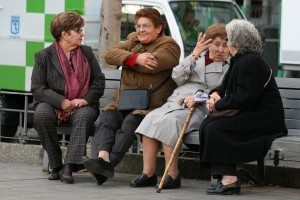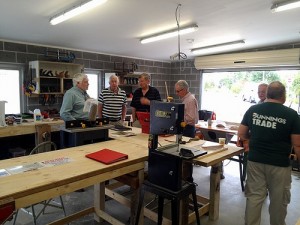 The Canadian Association on Gerontology’s 41st Annual Scientific and Educational Meeting, was in Vancouver this year, from October 18-20. Thanks to funding from the West End Seniors Network, I was able to attend the conference.
The Canadian Association on Gerontology’s 41st Annual Scientific and Educational Meeting, was in Vancouver this year, from October 18-20. Thanks to funding from the West End Seniors Network, I was able to attend the conference.
Hosted by the Department of Gerontology and the Gerontology Research Centre at Simon Fraser University, this informative, multi-disciplinary conference featured keynote speakers, symposia, poster sessions, interactive workshops, and exhibitions on a wide range of aging-related topics. Below I report on some of the sessions I attended.
Housing and residential care
The Canada Mortgage and Housing Corporation (CMHC) hosted an informative presentation on the state of seniors’ housing in Canada. It explored innovations in housing and community design aimed at addressing the needs of adults wishing to age in their homes, for whom changes in health, household composition, and finances can create unique housing challenges. Much of the information presented is available from the CMHC’s website.
The Longitudinal Study of Aging in a Retirement Community (LARC) explored the “age-friendliness” of purpose-built retirement villages in the UK. Among the study findings was that user fees for many services are a burden to many residents, which is a similar issue here in North America.
Calgary’s Kerby Centre (an organization serving adults 55+) partnered with the University of Calgary to study the unique housing needs of local “pre-seniors” (aged 55-64). According to interviews and focus groups with managers of subsidized housing organizations, those at greatest risk of being poorly housed are single women, immigrants, those with low income and poor health, and those who wish to live with their pets. They recommended that the social housing providers relax intake criteria to ensure that older adults in this age bracket do not become homeless.
Gloria Gutman from the Department of Gerontology at SFU discussed indoor air pollution, as 67% of all pollution is located inside our homes. She has found that carbon dioxide meters (click here for an example) can help older adults monitor indoor air quality and take appropriate steps to reduce pollution inside their homes.
Neighbourhood design
Researchers from the Bruyère Research Institute, the School of Psychology at the University of Ottawa, and the Dalla Lana School of Public Health at the University of Toronto examined the impact of neighbourhood design on the health and well-being of older adults in Ottawa. They examined data from the City of Ottawa, the Canadian Census, and the Ottawa Neighbourhood Study, which collaborated with local residents from 108 neighbourhoods to identify various determinants of healthy aging. According to these data, socioeconomic differences between neighbourhoods are associated with health determinants like walking amenities and hazards; amount of traffic; and access to healthy food. An understanding of these differences has informed the City of Ottawa’s policies on healthy aging and community development.
Atiya Mahmood from the Department of Gerontology at SFU discussed “walkability” in Vancouver. According to her research, well-maintained sidewalks (flat, no cracks), adequate street lighting (including sidewalk lighting), and appropriate timing of intersection lights (e.g., giving pedestrians enough time to cross the street), all encourage older adults to walk more frequently, which is important because walking is a great way to maintain physical, mental, and social well-being.
What was surprising to learn from Dr. Mahmood’s talk is that older adults do not use city parks very often; commonly cited reasons include access difficulties and concerns about personal safety. Older adults, particularly women, prefer community centers and adjoining green spaces because they provide a safe environment in which they can exercise and socialize at the same time.

Benches promote social interaction (Dirk Huijssoon)
Researchers from the Centre for Hip Health and Mobility in Vancouver presented findings from a survey of older adults’ opinions on the Comox-Helmcken Greenway, an important east-west corridor being built through Vancouver’s West End, connecting False Creek to Stanley Park. Respondents indicated the importance of adequate lighting, benches for resting and socializing, and the existence of points of interest along the greenway. Researchers from the OPENspace Research Centre in Edinburgh presented longitudinal research from the Inclusive Design for Getting Outdoors project, which confirmed that these features promote neighbourhood “livability” and encourage physical activity among older adults.
According to the Michigan Center on the Demography of Aging, the importance of community consultations and site inspections are vital to creating senior-friendly spaces. This became clear when looking at the situation in Detroit, where poor planning led to the creation of a neighbourhood park full of stray dogs and rowdy youth; not surprisingly, one-third of older adults in the nearby area almost never leave their homes.
Social connectedness and aging
At a session on community action, peer support, and volunteerism, we learned that Quebec considers participation in arts and culture to be a key component of successful aging and supports this with funds from the federal government’s New Horizons for Seniors Program. Cultural and arts events and projects that are inclusive, interactive, and conducive to intergenerational and cross-cultural contact are particularly beneficial.
Kristine Theurer from the Department of Gerontology at SFU emphasized the importance of peer support in long-term care facilities, where residents commonly feel helpless, lonely, and depressed. In a study using focus groups, systematic observation, and interviews with residents and staff in several long-term care facilities in BC, Theurer and her colleagues found that mutual support groups can decrease those feelings and increase coping skills, even among residents with moderate to severe cognitive impairment.
Kristin Reynolds and colleagues from the University of Manitoba examined the benefits of “Men’s Sheds” – a program developed in Australia that allows men to work on practical projects they find personally meaningful (e.g., wood and metal work) in the company of other men. The goal is to enhance social support, knowledge, skills, and overall well-being. Reynolds and her colleagues studied the experiences of older men who participate in Men’s Sheds programs in Manitoba and concluded that these programs promote social engagement and healthy, successful aging.
Finally, Dorothy Dooley and colleagues from Calgary’s Kerby Centre studied volunteerism among Baby Boomers (those born between 1946-1964), with an aim to understand how non-profit organizations can best recruit and retain volunteers from this demographic. A literature review and an open-ended survey of Baby Boomers revealed several barriers to volunteering: insufficient time; busy work schedules; caregiving obligations; lack of interesting and stimulating volunteer opportunities; and insufficient flexibility and choice. Boomers approach volunteering differently than previous generations: they are interested in volunteering only if they can use their work-related skills and if they can feel a sense of control and accomplishment in their volunteer activities. Non-profit organizations must keep this mind if they wish to curb the declining rate of volunteerism in this cohort.
Looking to the future
This three-day conference was a great way to learn about the latest gerontology research. Now that Vancouver is aiming to become an “age-friendly” city, it is important to take this research seriously. To this end, civic agencies like the Vancouver Seniors Advisory Committee would profit by partnering with SFU’s Gerontology Research Centre and other organizations conducting research on older adults.
The next CAG conference, Aging: From Cells to Society, will be held October 17-19, 2013, in Halifax.
The opinions are those of the author, Ms. Wadolna, and do not necessarily reflect those of the Seniors Advisory Committee.









